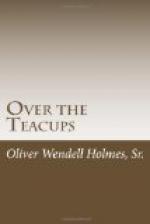I should not like to hear our past chief magistrates spoken of as Jack Adams or Jim Madison, and it would have been only as a political partisan that I should have reconciled myself to “Tom” Jefferson. So, in spite of “Ben” Jonson, “Tom” Moore, and “Jack” Sheppard, I prefer to speak of a fellow-citizen already venerable by his years, entitled to respect by useful services to his country, and recognized by many as the prophet of a new poetical dispensation, with the customary title of adults rather than by the free and easy school-boy abbreviation with which he introduced himself many years ago to the public. As for his rhapsodies, Number Seven, our “cracked Teacup,” says they sound to him like “fugues played on a big organ which has been struck by lightning.” So far as concerns literary independence, if we understand by that term the getting rid of our subjection to British criticism, such as it was in the days when the question was asked, “Who reads an American book?” we may consider it pretty well established. If it means dispensing with punctuation, coining words at will, self-revelation unrestrained by a sense of what is decorous, declamations in which everything is glorified without being idealized, “poetry” in which the reader must make the rhythms which the poet has not made for him, then I think we had better continue literary colonists. I shrink from a lawless independence to which all the virile energy and trampling audacity of Mr. Whitman fail to reconcile me. But there is room for everybody and everything in our huge hemisphere. Young America is like a three-year-old colt with his saddle and bridle just taken off. The first thing he wants to do is to roll. He is a droll object, sprawling in the grass with his four hoofs in the air; but he likes it, and it won’t harm us. So let him roll,—let him roll.
Of all The Teacups around our table, Number Five is the one who is the object of the greatest interest. Everybody wants to be her friend, and she has room enough in her hospitable nature to find a place for every one who is worthy of the privilege. The difficulty is that it is so hard to be her friend without becoming her lover. I have said before that she turns the subjects of her Circe-like enchantment, not into swine, but into lambs. The Professor and I move round among her lambs, the docile and amiable flock that come and go at her bidding, that follow her footsteps, and are content to live in the sunshine of her smile and within reach of the music of her voice. I like to get her away from their amiable bleatings; I love to talk with her about life, of which she has seen a great deal, for she knows what it is to be an idol in society and the centre of her social circle. It might be a question whether women or men most admire and love her. With her own sex she is always helpful, sympathizing, tender, charitable, sharing their griefs as well as taking part in their pleasures. With men it has seemed to make little difference whether they were young or old: all have found her the same sweet, generous, unaffected companion; fresh enough in feeling for the youngest, deep enough in the wisdom of the heart for the oldest. She does not pretend to be youthful, nor does she trouble herself that she has seen the roses of more Junes than many of—the younger women who gather round her. She has not had to say,




